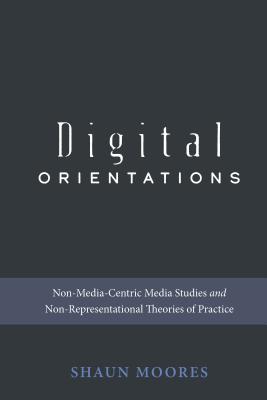Might it be possible to rearticulate the term digital in digital media, so that it refers at least as much to the deft movements or orientations of hands and fingers (of digits) as it does to the new media technologies themselves? What if digital media are understood as manual media?
Has the academic field of media studies tended to focus too much on media, and not enough on the practices and experiences of daily living that help to give media their meaningfulness? What if media researchers were to pay more attention to knowledge-in-movement or to matters of orientation and habitation, and rather less to those of symbolic representation and cognitive interpretation?
Digital Orientations is a bold call for non-media-centric media studies (and ultimately for everyday-life studies) with a non-representational theoretical emphasis. The author engages here with a broad range of work from across the humanities and social sciences, drawing on Merleau-Ponty’s phenomenological philosophy, Ingold’s anthropology, the geographies of Massey, Seamon and Thrift, and the sociologies of Bourdieu, Sudnow and Urry.











